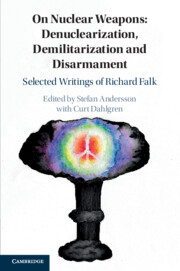 On Nuclear Weapons: Denuclearization, Demilitarization and Disarmament
On Nuclear Weapons: Denuclearization, Demilitarization and Disarmament Why Denuclearization?
from Part I - International Law and World Order
Published online by Cambridge University Press: 04 July 2019
While taking note of the growing anxiety, particularly on the part of the superpowers, over the spread of nuclear technology and of the frantic campaign (most of all on the part of the United States), through a combination of pressures and blandishments, to halt proliferation, the paper does not see much chance of the campaign succeeding so long as it remains suspect because, among other reasons, of its being spearheaded by a power which is itself the greatest proliferator and one, too, which has not only got an enormous stockpile of nuclear weapons, but is constantly engaged in evolving ever-more sophisticated (which means deadly) weapons. Nonproliferation, unless wedded to denuclearization, will continue to be viewed by nonnuclear states as unacceptably discriminatory and as a geopolitical confidence trick calculated to freeze the present hegemonistic global structure. Obviously, the first moves toward denuclearization have to be made by nuclear nations, but, above all, by the two superpowers. However, denuclearization will be illusory if a distinction is made between the military and the civilian uses of the atom. Denuclearization must, therefore, at some stage – now rather than later, when it might be too late – involve the total renunciation of nuclear power for whatever purpose and its substitution with other less centralized, less costly, and pollution-free sources of energy, such as sun, wind, water, and biomass.
To save this book to your Kindle, first ensure no-reply@cambridge.org is added to your Approved Personal Document E-mail List under your Personal Document Settings on the Manage Your Content and Devices page of your Amazon account. Then enter the ‘name’ part of your Kindle email address below. Find out more about saving to your Kindle.
Note you can select to save to either the @free.kindle.com or @kindle.com variations. ‘@free.kindle.com’ emails are free but can only be saved to your device when it is connected to wi-fi. ‘@kindle.com’ emails can be delivered even when you are not connected to wi-fi, but note that service fees apply.
Find out more about the Kindle Personal Document Service.
To save content items to your account, please confirm that you agree to abide by our usage policies. If this is the first time you use this feature, you will be asked to authorise Cambridge Core to connect with your account. Find out more about saving content to Dropbox.
To save content items to your account, please confirm that you agree to abide by our usage policies. If this is the first time you use this feature, you will be asked to authorise Cambridge Core to connect with your account. Find out more about saving content to Google Drive.